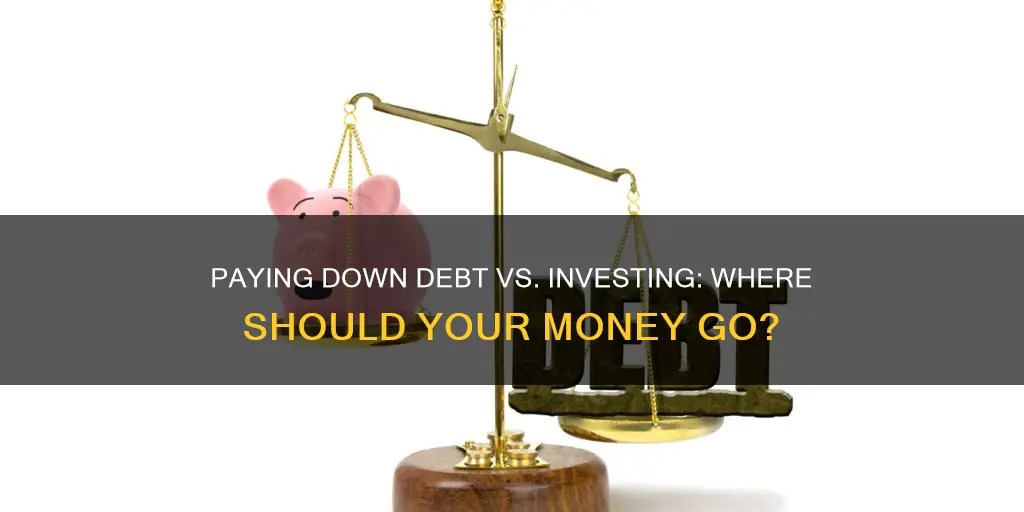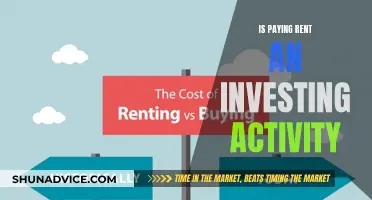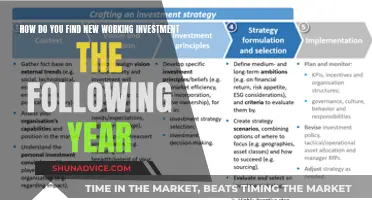
To Pay Debt or to Invest?
It's a question many people ask themselves: should I pay off my debt or invest my money? The answer depends on several factors, including the type of debt, interest rates, and personal financial goals.
The Case for Paying Off Debt First
Paying off debt, especially high-interest credit card debt, can be a priority for many. Credit cards often carry high interest rates, and the average interest rate on credit cards was 24.37% as of April 2024. By paying off this type of debt first, individuals can save more money in interest charges over time. It can also improve one's credit score, reduce stress and anxiety associated with debt, and increase cash flow for other financial goals.
The Case for Investing First
Investing is essential for building wealth over time and taking advantage of compounding interest. The earlier one starts investing, the more time their money has to grow. Investing also offers the potential for higher returns, especially over the long term, and allows individuals to diversify their portfolios to spread risk. Additionally, certain types of debt, such as student loan and mortgage interest, offer tax benefits that can reduce taxable income.
The Hybrid Approach
A hybrid approach that balances paying off debt and investing can be effective in achieving both short-term and long-term financial goals. This method allows individuals to make progress toward important financial milestones while maintaining flexibility to adjust their strategy as their financial situation changes.
Key Considerations
When deciding whether to pay off debt or invest, it's essential to review one's budget, create an emergency fund, and take advantage of any company retirement plan matches. Additionally, comparing the expected investment returns with the interest rates on debts can help determine the best course of action.
In summary, both paying off debt and investing are worthy financial goals. The decision depends on individual circumstances, with many experts recommending a hybrid approach to ensure a balance between short-term debt reduction and long-term investment goals.
| Characteristics | Values |
|---|---|
| Interest rate on debt | If the interest rate on your debt is 6% or greater, it is generally better to pay down debt before investing. |
| Type of debt | Credit card debt and other high-interest debt should be prioritised over lower-interest debt such as student loans or mortgages. |
| Risk tolerance | If you are comfortable with the volatility of investments, investing may be a better option. |
| Credit score | If you have a low credit score, paying down debt can improve it. |
| Retirement timeline | If retirement is approaching, it is generally better to prioritise paying off debt, especially high-interest debt. |
| Emergency fund | It is recommended to have an emergency fund before investing or paying off debt. |
| Company retirement plan | If your company offers to match contributions to a retirement plan, it is recommended to take advantage of this before investing or paying off debt. |
What You'll Learn

The pros of paying off debt first
Paying off debt first can be a great feeling, and there are several benefits to doing so.
Firstly, it can alleviate the stress that comes with owing money. The more debt you have, the more stressful your financial situation can be, so eliminating debt can bring you closer to financial peace.
Secondly, clearing debt means eliminating monthly payments, which translates to more cash on hand each month. This extra money can be put toward other financial goals, such as savings or purchases, and can improve your quality of life by providing some extra financial freedom.
Another benefit is that you will no longer have to worry about paying interest. Interest is money paid that doesn't provide any direct benefit, and the longer you owe money, the more interest you'll pay over time. By paying off debt, you save money that would have otherwise gone towards interest.
Paying off debt also helps secure your financial future. With less debt, you can put money that would have gone towards debt payments into an emergency fund, a retirement account, or any other financial goal. This improves your financial stability and security.
Finally, eliminating debt can improve your credit score. Specifically, targeting revolving debts, such as credit card debt, can lower your credit utilization rate, which can have a positive impact on your credit score.
Bankers: Bad Apples or Bad Barrel?
You may want to see also

The pros of investing for retirement first
- Investing is an essential part of building wealth over time. When you invest, your money has the potential to grow and generate income.
- The longer you invest, the more time your money has to compound. Compounding interest is a powerful force that can help your investments grow exponentially over time.
- Investing allows you to diversify your portfolio and spread your risk across different asset classes. While there is no guarantee that diversification assures a profit or protects against loss, this strategy can help mitigate risk and increase the potential for returns.
- Investing for retirement first can help you build wealth and ensure you have enough money to support you through your retirement years.
- Investing in retirement first can also provide tax benefits. For example, contributing to a traditional individual retirement account (IRA) allows you to subtract your annual IRA contribution from your taxable income when you file your taxes, resulting in lower tax payments.
- Investing in retirement can give you a head start on saving for the future, especially if you start early in your career. This can be advantageous as you may have fewer financial responsibilities and more time ahead of you to let your investments grow.
Cutting Out the Middleman: Strategies for Broker-Free Investing
You may want to see also

The case for doing both
The Benefits of Investing Early
There are several benefits to investing early and often. One of the most important reasons is compounding interest. The earlier you start investing, the more time works in your favour. For example, if you open a Roth IRA at 25 and invest $6,000 per year, it will grow to $1.28 million by the time you're 65, assuming a 7% annual return. This growth is largely due to compounding interest.
Another reason to invest early is the tax benefits associated with certain debts. Student loan and mortgage interest are tax-deductible, reducing your taxable income for the year.
The Benefits of Paying Off Debt
Paying off debt can improve your credit score, which is important if you want to buy a home or finance a vehicle. It can also reduce stress and anxiety, giving you peace of mind and allowing you to focus on other financial, personal, and family goals.
Additionally, paying off high-interest debt will likely provide a better return on your money than almost any investment. For example, if you have a credit card with a 20% interest rate, you will be losing more to interest payments than you would gain through most investments.
How to Do Both
Doing both is entirely possible and is, in fact, the path most experts recommend. Here are some steps to help you achieve a balance between investing and eliminating debt:
- Establish an emergency fund: This will help you avoid racking up more debt in case of unexpected expenses.
- Consider debt relief options: A debt management plan can help lower your debt by reducing your monthly payments and interest charges, freeing up money for investing.
- Find a side hustle: Increasing your income can help you eliminate debt more quickly and generate cash to invest.
- Create a budget: This will help you track your income and expenses, and find "extra" money to save or invest.
- Set goals: Setting clear and defined financial goals with deadlines will make it easier to track your progress.
Wellness Warriors: Who Invests in Health?
You may want to see also

How to decide when to pay off debt and when to invest
Deciding whether to pay off debt or invest can be challenging, especially when you are already burdened with debt. However, there are some key considerations that can help you decide which option to choose or whether to adopt a hybrid approach.
Key Considerations
- Interest rates on your debts: If you have high-interest debt, such as credit card debt, it is generally recommended to focus on paying it off first. Credit cards often carry high interest rates, which can make it challenging to eliminate the debt.
- Retirement timeline: It is generally advisable to avoid bringing debt into retirement. However, not all debt is the same. For example, a mortgage can be considered good debt as a home is an asset that can appreciate in value and provide stability.
- Ability to stay on top of debt payments: If you are struggling to maintain your household budget and make all your debt payments, it may be a good idea to focus on debt repayment first.
- Risk tolerance: Investing carries a higher risk than repaying debt, especially if you are investing in volatile assets such as stocks. If you are comfortable with taking on the risk of potential losses, investing may be a suitable option.
- Tax benefits: Certain types of debt, such as student loans and mortgage loan interest, may offer tax incentives. This can make it more advantageous to invest rather than repay these types of debt.
- Credit score: Paying off debt, especially credit card debt, can help improve your credit score. This can increase your borrowing options and improve your financial standing.
Hybrid Approach
Adopting a hybrid approach by allocating some money towards debt repayment and some towards investing is often recommended by experts. This approach allows you to work towards both short-term and long-term financial goals simultaneously. It also provides flexibility, enabling you to adjust your strategy as your financial situation changes.
Steps to Achieve a Balance:
- Establish an emergency fund: Before focusing solely on debt repayment or investing, it is crucial to have a safety net in case of unexpected expenses. Aim to save at least three to six months' worth of expenses.
- Don't skip company retirement plan matches: Many companies offer to match a percentage of your retirement contributions. Take advantage of this "free money" by contributing enough to qualify for the full match.
- Pay off high-interest debt first: Prioritize paying off debt with the highest interest rates, such as credit card debt, to save money on interest payments over time.
- Consider debt relief options: If you are struggling to manage your debt, consider seeking professional help to negotiate lower monthly payments and reduced interest rates.
- Increase your income: Finding a side hustle or an additional source of income can help accelerate debt repayment and provide more funds for investing.
When to Focus on Investing:
- Potential for higher returns: Investing has the potential to generate higher returns over the long term compared to the interest saved by early debt repayment, especially if you start investing early and take advantage of compounding interest.
- Low-interest debt: If you have low-interest debt, such as a loan or credit card with a low rate, you may consider investing instead. The returns on your investments may outweigh the interest accumulated on the debt.
When to Focus on Debt Repayment:
- High-interest debt: If you have high-interest debt, such as credit card debt, it is generally recommended to prioritize repayment to avoid accumulating even more interest over time.
- Mental and emotional burden: Carrying debt can be stressful and affect your mental well-being. Paying off debt can provide peace of mind and improve your overall financial health.
- Improving credit score: Reducing debt, especially credit card debt, can positively impact your credit score. This can increase your borrowing options and improve your financial standing.
In conclusion, the decision to pay off debt or invest depends on various factors, including interest rates, financial goals, risk tolerance, and retirement plans. Adopting a hybrid approach and seeking professional financial advice can help you navigate this decision effectively.
Strategic Investing: Unlocking the Key to Mortgage Freedom
You may want to see also

Tips for managing debt and investing
- Start with a budget: It's essential to budget and track your income and expenses to know how much extra cash you have to put towards debt or investments.
- Save an emergency fund: Before putting money towards debt or investments, build a small emergency fund to cover unexpected expenses. Aim for three to six months' worth of expenses.
- Don't skip your company's retirement plan: Many companies offer to match a percentage of your retirement contributions. Be sure to take advantage of this perk while working towards other financial goals.
- Pay off high-interest debt first: Focus on paying off debt with high-interest rates, such as credit card debt, before investing. This will save you money in the long run.
- Understand the basics of investing: Investing in the stock market comes with risks, but it can also provide increased growth potential. Consider speaking to a financial advisor to understand the basics and develop an investment strategy that aligns with your goals.
- Review the numbers: Compare your expected investment returns with the interest rates on your debt. Consider tax implications, as some types of interest may offer tax incentives.
- Consider your feelings: Math doesn't factor in your emotions or personal risk tolerance. If debt is causing you stress, there is nothing wrong with paying it off sooner rather than later.
- Talk to a financial advisor: A financial advisor can help you develop an investment strategy that aligns with your age, risk tolerance, and overall financial goals.
Crude Oil: Invest Now?
You may want to see also
Frequently asked questions
The sooner you eliminate debt, the less interest you will have to pay on that debt. With no debt payments, you may have more money in your budget to save and invest. Reducing debt can improve your credit score, which is important if you want to buy a home or finance a vehicle.
Investing has the potential to generate higher returns than paying off debt. This is especially true over the long term. While you want to eliminate debt, being adequately prepared for retirement means you should start investing as early as possible to take advantage of compounding interest.
If you have a loan or credit card with a low-interest rate, you can invest first. The money you could earn by investing in stocks, mutual funds or other investments could outweigh the interest paid to your debt if the market is performing well.







